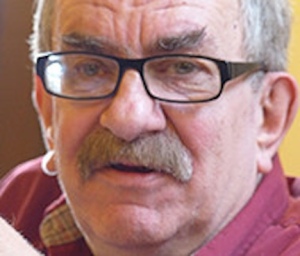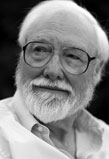The Well-Tempered Ear
‘Lord of the Rings’ to become an opera
Leave a Comment
PLEASE HELP THE EAR. IF YOU LIKE A CERTAIN BLOG POST, SPREAD THE WORD. FORWARD A LINK TO IT OR, SHARE IT or TAG IT (not just “Like” it) ON FACEBOOK. Performers can use the extra exposure to draw potential audience members to an event. And you might even attract new readers and subscribers to the blog.
By Jacob Stockinger
Here is something a lot of old — and especially new — opera fans should like.
The globally popular “The Lord of the Rings” — a popular set of epic fantasy books that was turned into a blockbuster movie (below) by Peter Jackson — will become a full-blown opera. Or perhaps, like Wagner’s more famous “Ring of the Nibelung” cycle, several operas.
Just this week, the J.R.R. Tolkien Estate granted permission to the British composer Paul Cofield Godfrey (below) to compose a complete opera based on the best-selling work if fantasy.
https://www.classicfm.com/music-news/lord-of-the-rings-opera-approved-tolkien-estate
Godfrey (below) has already composed some possible excerpts that will likely be used in the opera — and might have helped to persuade the Tolkien Estate to grant him permission. You can hear one — a burial dirge or “Lament for Boromir” — in the YouTube video at the bottom.
Translated into more than 38 languages with sales of more than 150 million copies, the fantasy — which met with mixed critical reaction when it was first published — has been nothing short of a phenomenon. One can justifiably expect guaranteed success of the operatic version.
For more about the history and the plot of “The Lord of the Rings’ see the Wikipedia entry:
https://en.wikipedia.org/wiki/The_Lord_of_the_Rings
Does an opera based on “The Lord of the Rings” interest you?
Do you think it will be successful?
The Ear wants to hear.
Tags: academic, alto, Android, Apple, Arts, Asia, asian, audience, baritone, bass, best-sellebest, best-selling, blockbuster, blog, Book, Boromir, British, British composer, Choir, choral music, Classic FM, Classical music, composer, Concert, copies, copy, critic, dirge, drama, duckduckgo, Earth, England, epiuc, estate, Facebook, famous, fan, fantasy, film, global, globe, Google Alert, Google Alerts, Google Search, grant, Great Britain, guarantee, History, J.R.R.Tolkien, Jacob Stockinger, lament, language, languages, like, link, Lord of the Rings, Madison, mezzosoprano, Microsoft, Microsoft Bing, million, movie, Music, musical drama, new, New Zealand, old, opera, opera-based, Orchestra, OS, Paul Cofield Godfrey, permission, Peter Jackson, Peter Jacobs, phenomenon, plot, popular, publish, published, reviews, Ring cycle, Ring of the Nibelung, sales, scholastic, sell, share, sing, singer, Singing, sold, soprano, success, successul, symphony, tag, Television, tenor, The Ear, The Lord of the Rings, The Tolkien Estate, The Well-Tempered Ear, theater, theatre, translate, TV, UK, United States, universal, vocal music, Wagner, Well-Tempered, Wisconsin, world, worldwide, YouTube
Classical music: Madison Symphony Orchestra’s music director John DeMain discusses the 2017-18 season with critic John W. Barker
6 Comments
By Jacob Stockinger
Here is a special posting, an interview with the Madison Symphony Orchestra‘s music director John DeMain about the next season, conducted and written by frequent guest critic and writer for this blog John W. Barker.
Barker (below) is an emeritus professor of Medieval history at the University of Wisconsin-Madison. He also is a well-known classical music critic who writes for Isthmus and the American Record Guide, and who hosts an early music show once a month on Sunday morning on WORT FM 89.9 FM. For years, he served on the Board of Advisors for the Madison Early Music Festival and frequently gives pre-concert lectures in Madison.
By John W. Barker
Last month, I had a welcome opportunity to sit down with John DeMain (below, in a photo by Prasad), music director of the Madison Symphony Orchestra, together with his marketing director, Peter Rodgers, to discuss the orchestra’s recently announced 2017-18 concert season. (NOTE: Today is the deadline for current subscribers to renew and keep their seats. You can call 608 257-3734 or go to https://www.madisonsymphony.org/reneworder)
This meeting allowed me new insights into the various factors that go into selecting a season’s repertoire. It also gave me further appreciation of Maestro DeMain’s personality and talents.
It further revealed the unfairness of some criticism made that the coming season is “conservative” and repetitive of familiar works. In fact, his programming involves very thoughtful awareness of the differing expectations of the varied audience.
It has become customary to make the season’s opening concert a showcase for talented members of the orchestra, rather than for guest soloists.
The September program thus offers a masterpiece I particularly relish, Hector Berlioz’s Harold in Italy, a symphony with viola obbligato — featuring the orchestra’s principal violist, Chris Dozoryst (below).
But the inclusion of the neglected Fifth or “Reformation” Symphony by Felix Mendelssohn was decided as a link to this year’s 500th-anniversary commemoration of Martin Luther’s launching of the Lutheran Reformation in 1517. Also on the program is Leopold Stokowski’s orchestral arrangement of the Toccata and Fugue in D Minor for organ by Johann Sebastian Bach.
The October program contains a notable example of a familiar and popular “warhorse,” Antonin Dvorak’s Symphony No. 9, “From the New World.” This was indeed performed by the MSO two seasons back as part of the “Beyond the Score” presentations. DeMain indicates that the close repetition is made deliberately to connect with that past event, to expand further the audiences’ understanding of the work.
He is also juxtaposing the symphony with the appearance of the acclaimed Olga Kern (below), playing the Piano Concerto by Samuel Barber and with the “Mother Goose” Suite by Maurice Ravel.
The November soloist is guitarist Sharon Isbin, in two concertos, one new (“Affinity” by Chris Brubeck) and one old (Concierto de Aranjuez by Joaquin Rodrigo) She plays with her instrument electronically amplified, something very off-putting in my experience. But DeMain notes that all guitarists do that now in concert work, and he wanted to include the guitar to bring in new and different audience members.
Inclusion of suites by Aaron Copland and Manuel de Falla – “Billy the Kid” and “The Three-Cornered Hat,” respectively — also represent popular appeal.
January will bring a triumph for DeMain: the appearance of violinist Gil Shaham (below), after 15 years of efforts to secure him. Shaham will perform the Violin Concerto by Peter Tchaikovsky.
The all-Russian program also allows DeMain to venture for the first time into “The Love for Three Oranges” suite by Sergei Prokofiev and the Third Symphony of Sergei Rachmaninoff.
The issue of “warhorse” repetition is raised by the First Symphony by Johannes Brahms in the February program. But DeMain points out that it has been 10 years since the MSO played the work, a significant one that richly deserves performance by now.
He is also proud to include with it the outstanding Rossini opera overture (Semiramide) and the rarely heard Cello Concerto, with German cellist Alban Gerhardt (below), by the 20th-century British composer William Walton.
DeMain admits to mixed feelings about the “Beyond the Score” presentations of music and background context, but he is confident that the one offered (one night, outside subscriptions) on March 18, about the monumental Enigma Variations, by Sir Edward Elgar, (below) will work well.
The combination in April of Benjamin Britten’s powerful Sinfonia da Requiem and Robert Schumann’s First Symphony (“Spring”) with Antonin Dvorak’s sadly neglected Violin Concerto has special meanings for the maestro. It allows the return of the greatly admired Augustin Hadelich (below) as soloist.
But it also allows DeMain’s return, for his first time since 1974, to the Schumann score, with which he had a crucial encounter in a youthful appearance with the Pittsburgh Symphony.
Finally, the May program is an unusually exciting combination of Mozart’s too-little-appreciated Piano Concerto No. 22 with soloist Christopher O’Riley (below) of NPR’s “From the Top” with the roof-raising Glagolitic Mass, featuring the Madison Symphony Chorus, of Leos Janacek.
DeMain has made important commitments to the orchestral music of Janacek (below) before this, and his advance to the composer’s great blockbuster choral work is a landmark.
Amid savoring DeMain’s thoughts on the season – which also includes the MSO’s traditional Christmas concert in early December — and his wonderful recollections of past experiences, I came to recognize more than ever the remarkable combination of talents he brings to his Madison podium.
Beyond so many conductors, DeMain has had deeply engaging phases of his career in orchestral literature (large and small), in opera and musical theater, and in chamber music, while being himself an accomplished pianist.
With the breadth of his range, he brings a particular sensitivity to the contexts and diversities of what he conducts. He has become to his musicians not only a skilled guide, but also a subtle teacher, deepening their understanding without any hint of pedantry.
It cannot be said enough how truly blessed we are to have him with us in Madison.
For more information about the 2017-18 season, including specific dates and times, and about purchasing tickets for new subscribers and renewing subscribers, go to:
http://www.madisonsymphony.org/17-18
Tags: Aaron Copland, Alban Gerhardt, American Record Guide, amplification, arrangement, Arts, Augustin Hadelich, Bach, Baroque, Benjamin Britten, Berlioz, Beyond the Score, Billy the Kid, blockbuster, Brahms, Cello, Chamber music, choral music, Chris Brubeck, Christmas, Christopher O'Riley, Classical music, composer, concerto, Concierto de Aranjuez, critic, Dvorak, Early music, Elgar, Enigma Variations, From the New World, From The Top, Gil Shaham, Glagolitic, guitar, Harold in Italy, History, Isthmus, Italy, Jacob Stockinger, Janacek, Joaquin Rodrigo, Johann Sebastian Bach, Johannes Brahms, John DeMain, John W. Barker, landmark, lecture, Love of Three Oranges, Luther, Madison, Madison Early Music Festival, Madison Symphony Chorus, Madison Symphony Orchestra, Maestro, Manuel de Falla, marketing, Martin Luther, mass, Medieval, MEMF, Mendelssohn, Mother Goose, Mozart, Music, Music director, New World, NPR, Olga Kern, on-line, online, opera, Orchestra, orchestral, organ, Overture, Overture Center, personality, Pianist, Piano, Piano concerto, Pittsburgh Symphony Orchestra, professor, Prokofiev, Rachmaninpff, Ravel, Reformation, renew, repertoire, Requiem, Robert Schumann, Rossini, Russian, Samuel Barber, score, Semiramide, Sergei Prokofiev, Sergei Rachmaninoff, Sharon Isbin, soloist, Spring, Stokowski, subscriber, Suite, symphony, talent, Tchaikovsky, Three-Cornered Hat, Toccata and Fugue in D minor, traits, United States, University of Wisconsin-Madison School of Music, University of Wisconsin–Madison, Viola, Violin, Violin concerto, vocal music, Walton, warhorse, Wisconsin, Wolfgang Amadeus Mozart, WORT-FM 89.9, YouTube
- May 2024
- April 2024
- March 2024
- February 2024
- January 2024
- December 2023
- November 2023
- October 2023
- September 2023
- August 2023
- July 2023
- June 2023
- May 2023
- April 2023
- March 2023
- February 2023
- January 2023
- December 2022
- October 2022
- September 2022
- June 2022
- May 2022
- April 2022
- March 2022
- July 2021
- June 2021
- May 2021
- April 2021
- March 2021
- February 2021
- January 2021
- December 2020
- November 2020
- October 2020
- September 2020
- August 2020
- July 2020
- June 2020
- May 2020
- April 2020
- March 2020
- February 2020
- January 2020
- December 2019
- November 2019
- October 2019
- September 2019
- August 2019
- July 2019
- June 2019
- May 2019
- April 2019
- March 2019
- February 2019
- January 2019
- December 2018
- November 2018
- October 2018
- September 2018
- August 2018
- July 2018
- June 2018
- May 2018
- April 2018
- March 2018
- February 2018
- January 2018
- December 2017
- November 2017
- October 2017
- September 2017
- August 2017
- July 2017
- June 2017
- May 2017
- April 2017
- March 2017
- February 2017
- January 2017
- December 2016
- November 2016
- October 2016
- September 2016
- August 2016
- July 2016
- June 2016
- May 2016
- April 2016
- March 2016
- February 2016
- January 2016
- December 2015
- November 2015
- October 2015
- September 2015
- August 2015
- July 2015
- June 2015
- May 2015
- April 2015
- March 2015
- February 2015
- January 2015
- December 2014
- November 2014
- October 2014
- September 2014
- August 2014
- July 2014
- June 2014
- May 2014
- April 2014
- March 2014
- February 2014
- January 2014
- December 2013
- November 2013
- October 2013
- September 2013
- August 2013
- July 2013
- June 2013
- May 2013
- April 2013
- March 2013
- February 2013
- January 2013
- December 2012
- November 2012
- October 2012
- September 2012
- August 2012
- July 2012
- June 2012
- May 2012
- April 2012
- March 2012
- February 2012
- January 2012
- December 2011
- November 2011
- October 2011
- September 2011
- August 2011
- July 2011
- June 2011
- May 2011
- April 2011
- March 2011
- February 2011
- January 2011
- December 2010
- November 2010
- October 2010
- September 2010
- August 2010
- July 2010
- June 2010
- May 2010
- April 2010
- March 2010
- February 2010
- January 2010
- December 2009
- November 2009
- October 2009
- September 2009
- August 2009
Archives
- 2,491,214 hits
Blog Stats
Recent Comments
| Brian Jefferies on Classical music: A major reass… | |
| welltemperedear on What made Beethoven sick and… | |
| rlhess5d5b7e5dff on What made Beethoven sick and… | |
| welltemperedear on Beethoven’s Ninth turns 200… | |
| Robert Graebner on Beethoven’s Ninth turns 200… |
Tags
#BlogPost #BlogPosting #ChamberMusic #FacebookPost #FacebookPosting #MeadWitterSchoolofMusic #TheEar #UniversityofWisconsin-Madison #YouTubevideo Arts audience Bach Baroque Beethoven blog Cello Chamber music choral music Classical music Compact Disc composer Concert concerto conductor Early music Facebook forward Franz Schubert George Frideric Handel Jacob Stockinger Johannes Brahms Johann Sebastian Bach John DeMain like link Ludwig van Beethoven Madison Madison Opera Madison Symphony Orchestra Mead Witter School of Music Mozart Music New Music New York City NPR opera Orchestra Overture Center performer Pianist Piano post posting program share singer Sonata song soprano String quartet Student symphony tag The Ear United States University of Wisconsin-Madison School of Music University of Wisconsin–Madison Viola Violin vocal music Wisconsin Wisconsin Chamber Orchestra wisconsin public radio Wolfgang Amadeus Mozart YouTube











